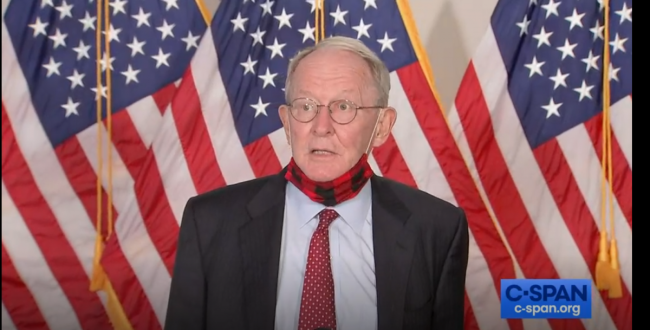You have /5 articles left.
Sign up for a free account or log in.

Senator Lamar Alexander speaks to reporters about the upcoming Republican proposal for the next coronavirus package.
C-SPAN
A key sticking point emerged between key Democrats and Republicans Thursday over what to do about 43 million Americans who have been excused from making student loan payments during the pandemic, even as Republican senators and the Trump administration continued trying to craft the details of their proposal for the next coronavirus relief package.
Democrats in both the House and the Senate, including Senator Patty Murray, slammed a proposal by Lamar Alexander, the Senate’s top Republican on education, that would continue to spare only those with no incomes from making payments.
Meanwhile, even as Republican Senate Majority Leader Mitch McConnell said the details of his proposal would not be released until Monday, other divisions with Democrats over issues critical to higher education were emerging. Alexander, in an impromptu press conference, said the White House agreed to include $30 billion for education, a figure Murray, of Washington State, said is not enough.
At issue in the debate over student loans is that Congress’s previous coronavirus aid package, the CARES Act, excused borrowers from making payments, interest-free, only through Sept. 30.
Alexander, of Tennessee, told reporters that a deal over the education part of the upcoming proposal, worked out Wednesday night between he, other Senate Republican leaders, Treasury Secretary Steven Mnuchin and White House chief of staff Mark Meadows, would include his proposal.
Those with no incomes, excluding unemployment, would continue to be excused from making payments. Those that do have incomes would have to pay no more than 10 percent of their discretionary income, allowing for spending on essentials such as food and housing.
“That should be very welcome news for the 43 million Americans who have student loans to pay back,” Alexander said.
However, advocacy groups calling for larger-scale student debt forgiveness have said that borrowers already have the option of reducing their payments to a portion of their discretionary income. Those who have remained employed but have had their pay cut during the economic fallout of the pandemic would have to resume making payments again under Alexander’s plan.
“We are still in the middle of an economic crisis as a result of the pandemic, and this unworkable proposal is in no way a substitute for extending the pause on payments,” Murray said in a statement. “This bill would make massive and complex changes to our student loan repayment plans that would actually reduce benefits for struggling borrowers in the middle of a pandemic and recession.”
A Democratic aide on the House education committee also criticized the idea.
“Senator Alexander’s proposal is just a worse version of the current income-driven repayment plan and would effectively cut benefits for student borrowers who enroll,” the aide said. “As student borrowers continue to face severe financial hardship, any new program during this pandemic should be focused on providing borrowers with more relief, not less.”
The aide called on Republicans to adopt the Democratic proposal to extend and pass the HEROES Act, which would suspend student loan payments for an additional year and reduce the balances on the loans of economically distressed borrowers by $10,000, providing student debt relief for more than 20 million federal student loan borrowers. Democrats are also proposing to completely eliminate the debt of those who had been defrauded by Corinthian Colleges Inc. or ITT Technical Institute, for-profit colleges that misled prospective students about the value of an education provided by the two institutions.
However, Senate Republicans have balked at the idea of forgiving debt and refused to include it in the CARES package. A Republican aide on the Senate education committee responded to Murray and the House aide’s remarks, saying that Democrats will have to compromise to get relief for borrowers in the aid package.
“Instead of making unrealistic political statements about canceling student loan debt, Democrats should come to the table and work with Republicans on bipartisan solutions that actually help the American people,” the Republican aide said.
“Without bipartisan congressional action, 43 million student loan borrowers face restarting monthly payments on Oct. 1 and new borrowers would be stuck with a confusing array of nine repayment options,” the aide said. “Chairman Alexander’s bipartisan proposal is designed to achieve a result that will permanently solve this problem and provide immediate help to those unemployed due to the COVID-19 pandemic.”
While not referring specifically to forgiving student debt, McConnell, of Kentucky, said on the Senate floor, “Our proposal will not waste the American people’s time with go-nowhere socialist fantasies.”
Meanwhile, as congressional negotiators prepare to race to hash out a bipartisan deal before expanded unemployment benefits end next Friday, a debate is brewing over the size of the package, including the amount of help colleges and states will get.
Alexander said the White House had agreed to include in the package $105 billion for education, including $30 billion for higher education, about $16 billion less than the $46.6 billion institutions had requested to ease the financial hit they have taken during the recession. The figure does not include the $74 billion the American Council on Education, a group of presidents representing colleges and universities, had estimated would be the price tag for institutions to safely reopen campuses.
Murray said in a statement to Inside Higher Ed that the $30 billion falls short.
“Congress needs to provide the $132 billion that our colleges and universities need to survive this pandemic and to safely educate and support their students,” she said.
Also, according to a summary of the Republican proposal that was making the rounds on Capitol Hill, as well as press reports, the upcoming opening bid in negotiations with Democrats will not include more aid to states, but will give states more flexibility in using the money they have already received in the CARES Act.
Colleges and universities have called for the aid to soften the hundreds of millions in cuts states legislatures are making to higher education funding. Congressman Bobby Scott, the Democratic chairman of the House education committee, noted during a virtual press call Tuesday that additional federal funding to colleges wouldn’t help much if it were to be offset if states follow through with higher education cuts.
Referring to McConnell, the Virginia congressman said, “If he puts up $100 billion for education and nothing for state and local, they’re going to cut more than a $100 billion out of education.”
The University of California system said in a statement that the state cut $300 million in funding for the system. But under a provision of the budget signed by the state’s Democratic governor, Gavin Newsom, the system would instead get a $170 million increase if California receives at least $14 billion in federal aid before Oct. 15.
California State University spokeswoman Toni Molle on Thursday said that under Newsom's budget provision, the university would see its $299 million cut reduced if more federal aid comes.
While a number of details in the upcoming Republican proposal remain unknown, McConnell reiterated that it will include a provision making it more difficult for people who get the coronavirus to sue colleges, K-12 schools, businesses and charities. Those entities would only be held liable for “gross negligence or intentional misconduct.” As first reported by Inside Higher Ed, colleges and universities have been pushing for the protection. But Murray has already said she opposes the idea.
Meanwhile, a number of other Republican differences with the Democratic proposals also appeared to await negotiations over the package.
Democrats, in their proposal for the package contained in the HEROES Act passed in May by the House, would clarify that college students who are undocumented immigrants are eligible for CARES Act emergency grants to help pay for expenses like housing, food and computers they needed when classes went online. It also prohibited Education Secretary Betsy DeVos from deciding who is eligible for the aid after she ruled that undocumented students as well as others who do not qualify for federal student aid cannot get the grants.
Democrats and Republicans are also likely to disagree over whether for-profit higher education institutions should receive federal aid as they did in the CARES Act. On Thursday, 10 Democratic senators, including Elizabeth Warren of Massachusetts and Kamala Harris of California, urged congressional leaders in a letter to exclude for-profit institutions from any higher education aid in the package.
“For-profit colleges have a demonstrated record of capitalizing on economic anxieties to turn a profit,” the senators wrote. “We urge you to protect students and not provide additional taxpayer money, especially without accountability to for-profit colleges -- especially when the needs among public and nonprofit institutions of higher education are so great.”




